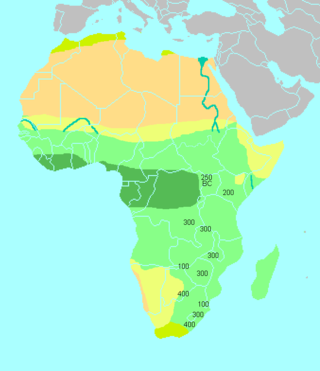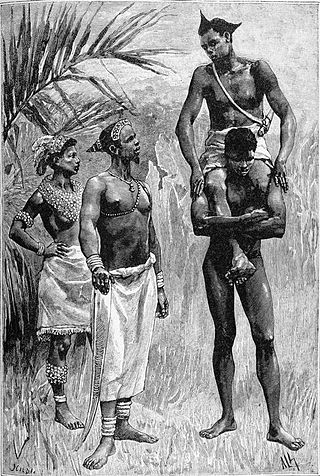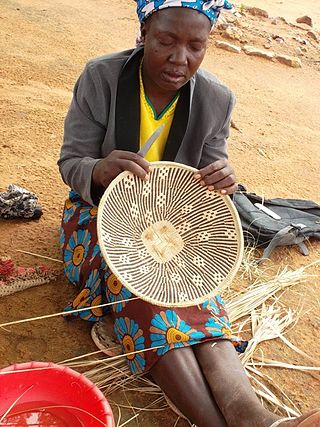Related Research Articles

Zambia, officially the Republic of Zambia, is a landlocked country at the crossroads of Central, Southern and East Africa. It is typically referred to being in South-Central Africa or Southern Africa. It is bordered to the north by the Democratic Republic of the Congo, Tanzania to the north-east, Malawi to the east, Mozambique to the southeast, Zimbabwe and Botswana to the south, Namibia to the southwest, and Angola to the west. The capital city of Zambia is Lusaka, located in the south-central part of Zambia. The population is concentrated mainly around Lusaka in the south and the Copperbelt Province to the north, the core economic hubs of the country.

The history of Zambia experienced many stages from colonisation to independence from Britain on 24 October 1964. Northern Rhodesia became a British sphere of influence in the present-day region of Zambia in 1888, and was officially proclaimed a British protectorate in 1924. After many years of suggested mergers, Southern Rhodesia, Northern Rhodesia, and Nyasaland were merged into the British Federation of Rhodesia and Nyasaland.

A refugee, according to the United Nations High Commissioner for Refugees (UNHCR), is a person "forced to flee their own country and seek safety in another country. They are unable to return to their own country because of feared persecution as a result of who they are, what they believe in or say, or because of armed conflict, violence or serious public disorder." Such a person may be called an asylum seeker until granted refugee status by a contracting state or by the UNHCR if they formally make a claim for asylum.

The Zambezi is the fourth-longest river in Africa, the longest east-flowing river in Africa and the largest flowing into the Indian Ocean from Africa. Its drainage basin covers 1,390,000 km2 (540,000 sq mi), slightly less than half of the Nile's. The 2,574 km (1,599 mi) river rises in Zambia and flows through eastern Angola, along the north-eastern border of Namibia and the northern border of Botswana, then along the border between Zambia and Zimbabwe to Mozambique, where it crosses the country to empty into the Indian Ocean.

The Bantu expansion was a major series of migrations of the original Proto-Bantu-speaking group, which spread from an original nucleus around West-Central Africa. In the process, the Proto-Bantu-speaking settlers displaced, eliminated or absorbed pre-existing hunter-gatherer and pastoralist groups that they encountered.

KhweKWAY is a dialect continuum of the Khoe branch of the Khoe-Kwadi family of Namibia, Angola, Botswana, South Africa, and parts of Zambia, with some 8,000 speakers.

The First Congo War, also known as Africa's First World War, was a civil and international military conflict that lasted from 24 October 1996 to 16 May 1997, primarily taking place in Zaire. The war resulted in the overthrow of Zairean President Mobutu Sese Seko, who was replaced by rebel leader Laurent-Désiré Kabila. This conflict, which also involved multiple neighboring countries, set the stage for the Second Congo War (1998–2003) due to tensions between Kabila and his former allies.

Repatriation is the return of a thing or person to its or their country of origin, respectively. The term may refer to non-human entities, such as converting a foreign currency into the currency of one's own country, as well as the return of military personnel to their place of origin following a war. It also applies to diplomatic envoys, international officials as well as expatriates and migrants in time of international crisis. For refugees, asylum seekers and illegal migrants, repatriation can mean either voluntary return or deportation.

Bhutanese refugees are Lhotshampas ("southerners"), a group of Nepali language-speaking Bhutanese people. These refugees registered in refugee camps in eastern Nepal during the 1990s as Bhutanese citizens who fled or were deported from Bhutan during the protest against the Bhutanese government by some of the Lhotshampas demanding human rights and democracy in Bhutan. As Nepal and Bhutan have yet to implement an agreement on repatriation, most Bhutanese refugees have since resettled in North America, Oceania and Europe under the auspices of the Office of the United Nations High Commissioner for Refugees. Many Lhotshampa have also migrated to areas of West Bengal and Assam in India independently of the UNHCR.

The Lunda are a Bantu ethnic group that originated in what is now the Democratic Republic of the Congo along the Kalanyi River and formed the Kingdom of Lunda in the 17th century under their ruler, Mwata Yamvo or Mwaant Yav, with their capital at Musumba. From there they spread widely through Katanga and into Eastern Angola, north-western Zambia and the Luapula valley of Zambia.

The Tonga people of Zambia and Zimbabwe are a Bantu ethnic group of southern Zambia and neighbouring northern Zimbabwe, and to a lesser extent, in Mozambique. They are related to the Batoka who are part of the Tokaleya people in the same area, but not to the Tonga people of Malawi. In southern Zambia they are patrons of the Kafue Twa. They differ culturally and linguistically from the Tsonga people of South Africa and southern Mozambique.

The Congolese National Liberation Front was a Congolese left-wing armed opposition group and political party that was founded by rebels of Katangese origin and composed of ex-members of the Katangese Gendarmerie. It was active mainly in Angola and Zaire during the 1970s.
This is a history of Katanga Province and the former independent State of Katanga, as well as the history of the region prior to colonization.

Angola is located on the western Atlantic Coast of Southern Africa between Namibia and the Republic of the Congo. It also is bordered by the Democratic Republic of the Congo and Zambia to the east. The country consists of a sparsely watered and somewhat sterile coastal plain extending inland for a distance varying from 50 to 160 km. Slightly inland and parallel to the coast is a belt of hills and mountains and behind those a large plateau. The total land size is 1,246,700 km2 (481,400 sq mi). It has an Exclusive Economic Zone of 518,433 km2 (200,168 sq mi).
There are various communities of Angolans in Namibia.
Sudanese refugees are people originating from the country of Sudan, seeking refuge outside the borders of their native country. In recent history, Sudan has been the stage for prolonged conflicts and civil wars, as well as environmental changes, namely desertification. These forces have resulted not only in violence and famine but also the forced migration of large numbers of the Sudanese population, both inside and outside the country's borders. Given the expansive geographic territory of Sudan, and the regional and ethnic tensions and conflicts, much of the forced migration in Sudan has been internal. Yet, these populations are not immune to similar issues that typically accompany refugeedom, including economic hardship and providing themselves and their families with sustenance and basic needs. With the creation of a South Sudanese state, questions surrounding southern Sudanese IDPs may become questions of South Sudanese refugees.

The Twa, often referred to as Batwa or Mutwa (singular), are indigenous hunter-gatherer peoples of the Great Lakes Region in Central Africa, recognized as some of the earliest inhabitants of the area. Historically and academically, the term “Pygmy” has been used to describe these groups, however, it is considered derogatory, particularly by the Twa themselves. While some Batwa activists accept the term as an acknowledgement of their indigenous status, most prefer specific ethnic labels such as Bambuti, Baaka, and Bambendjelle.
Africa Humanitarian Action (AHA) is a non-governmental organization that provides relief services to countries in Africa. It was founded by Dr. David Zawde in 1994 in response to the Rwandan genocide.
The Mbunda or Vambunda are a Bantu people who, during the Bantu migrations, came from the north to south-eastern Angola and finally Barotseland, now part of Zambia. Their core is at present found in the south-east of Angola from the Lunguevungu river in Moxico to the Cuando Cubango Province.
A refugee crisis can refer to difficulties and dangerous situations in the reception of large groups of forcibly displaced persons. These could be either internally displaced, refugees, asylum seekers or any other huge groups of migrants.
References
Notes
- ↑ Hansen 2001 , p. 35
- ↑ Hansen 2001 , p. 36
- 1 2 Hansen 2001 , p. 37
- ↑ Hansen 2001 , p. 38
- ↑ Krause et al. 2001 , p. 11
- ↑ Hansen 1981 , p. 175
- ↑ "UN to resume repatriation of Angolans from Zambia", The Namibian, 2006-03-16, retrieved 2009-08-20
- ↑ Bakewell 2000 , p. 356
Sources
- Bakewell, Oliver (2000), "Repatriation and Self-Settled Refugees in Zambia: Bringing Solutions to the Wrong Problems", Journal of Refugee Studies, 13 (4): 356–373, doi:10.1093/jrs/13.4.356
- Hansen, Art (1981), "Refugee Dynamics: Angolans in Zambia 1966 to 1972", International Migration Review, 15 (1/2), The Center for Migration Studies of New York, Inc.: 175–194, doi:10.2307/2545335, JSTOR 2545335
- Hansen, Art (2001), "Angolan refugee displacement and settlement in Zaire and Zambia", in De Wet, C. J.; Fox, R. C. (eds.), Transforming settlement in southern Africa, International African Seminars, vol. 6, Edinburgh University Press, ISBN 978-0-7486-1465-3
- Krause, Sandra; Matthews, Julia; Meyers, Janet; Mutambo, Margaret (September 2001), Assessment of Reproductive Health for Refugees in Zambia (PDF), Reproductive Health for Refugees Consortium, ISBN 1-58030-016-2 , retrieved 2009-08-20